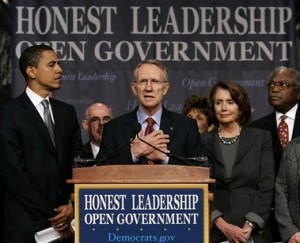
Democratic President Barack Obama, and Democratic Speaker of the House Nancy Pelosi and Senate Leader Harry Reid, signaled this morning the pathway for the final Democratic push for the passage of Obamacare: the reconciliation process
Three days before the highly publicized health care summit, billed by President Obama and Democrats as an opportunity for bipartisan negotiations regarding the provisions of a potential health care overhaul, the White House signaled its intent to move forward with a $950 billion dollar Democrats-only bill that can garner, at most, a bare 51 vote majority in the United States Senate. Indeed, eight Democratic Senators (including Lieberman) have already gone on record opposing the use of reconciliation to ram through the Obamacare package. Despite Obama’s prior pledges of bipartisan negotiations with the GOP and this morning’s bipartisan rhetoric from the White House, the fact is that the only bipartisanship associated with health care reform is the bipartisan opposition in the House to Obamacare (39 Democratic “no” votes) and the bipartisan opposition to the use of reconciliation to pass Obamacare through the Senate.
The substantive content of this morning’s latest White House version of Obamacare is essentially the same plan negotiated between the President, House Speaker Nancy Pelosi and Senate Majority Leader Harry Reid in the days leading up to Republican Scott Brown’s January 2010 election to the Senate from liberal Massachusetts and the White House roadmap contemplates the use of the reconciliation process in the Senate so as to avoid the need for a 60 vote majority:
“This is our take on the best way to merge the House and Senate bills,” a senior White House official told ABC News. The official said the proposal was “informed by our conversations from negotiations” before Sen. Scott Brown, R-Mass., was elected, thus depriving Democrats of their 60-vote supermajority, as well as from subsequent discussions.
“We thought it would be a more productive meeting if we brought one consolidated plan to use as jumping-off point,” the official said. “We hope the Republicans do the same.”
By posting their proposals in such a form, White House officials are providing a roadmap for how they think they can best pass health care reform in the new post-Massachusetts Senate race reality: have the House pass the Senate bill, then use reconciliation rules requiring only a majority Senate vote to pass the “fix” to make the bill more palatable.
In the conference call with reporters this morning accompanying the disclosure of the latest iteration of Obamacare, White House officials explicitly stated they intend to use reconciliation to pass Obamacare without any GOP Senate votes:
In the course of unveiling Obama’s new health reform proposal on a conference call with reporters this morning, White House advisers made it clearer than ever before: If the GOP filibusters health reform, Dems will move forward on their own and pass it via reconciliation.
The assertion, which is likely to spark an angry response from GOP leaders, ups the stakes in advance of the summit by essentially daring Republicans to try to block reform.
“The President expects and believes the American people deserve an up or down vote on health reform,” White House communications director Dan Pfeiffer said on the call.
Accordingly, it appears that the Obama Administration has settled on pursing the use of the Senate reconciliation process, instead of normal order which would require a 60 vote majority, to pass the most far-reaching reform of the health care system in our nation’s history. Indeed, the “package is designed to help us [use reconciliation] if the Republican party decides to filibuster health care reform,” stated White House Communications Director Dan Pfeiffer.
The new Obamacare policy summary and the conference call with reporters strongly indicate that little, if any, substantive discussions will occur at Thursday’s health care summit as the Democrats have now settled on the use of reconciliation as the pathway to final passage of Obamacare. The GOP’s incremental ideas such as allowing the purchase of insurance across state lines, significant tort reform and the use of risk pools for uninsurable Americans with preexisting conditions are nowhere to be found in this morning’s announcement nor in the present Democratic bills in the Senate and House and are essentially inconsistent with the comprehensive, government-centered, Democratic health care reform plans. Furthermore, in a move apparently designed to paint the GOP as pro-insurance, Obama also proposed substantial new federal price controls over the cost of health insurance as part of this morning’s summary.
The above-described White House posture this morning stands in stark contrast to their posture just two weeks ago when the idea of a health care summit was first pitched by President Obama. At that time, Obama promised to engage in substantive negotiations with the GOP on all parts of health care reform plan during the summit:
“I want to come back and have a large meeting, Republicans and Democrats, to go through systematically all the best ideas that are out there and move it forward” Mr. Obama said in the interview from the White House Library.
The 2/8/2010 NYT piece quoted above notes that it “remained an open question whether the meeting could lead to real consensus on health care, or whether it would serve only to allow Democrats to frame a political argument against the Republicans going into the midterm campaign.” Considering this morning’s developments, and the clearly stated intent to move forward with reconciliation passage of the intra-Democrat negotiated Obamacare, there no longer remains a “open question” and instead Obama intends the coming summit to “serve only to allow Democrats to frame a political argument against the Republicans going into the midterm campaign.”
For the ideological left, this morning’s White House summary and the coming health care summit represent “the last, best shot” to pass a comprehensive, government-centered health care reform plan. To a majority of Americans, including almost all conservatives, a strong majority of independents and even some liberals, the Obama Administration’s continued relentless focus on forcing a strongly partisan Obamacare package through Congress is an unfavorable development, as shown by public polling of Obama’s job approval and the approval of the Democratic health care reform packages in Congress.
At least eight Democratic Senators have already announced their opposition to the use of reconciliation to pass Obamacare, and those Democratic Senators will almost certainly be joined by the 41 GOP Senators in opposition to the President’s reconciliation plan as announced this morning. It appears from early GOP responses that the GOP intends to attempt to garner 10 Democratic Senator votes to block the use of reconciliation (with 10 Democratic votes, the GOP would have the 51 votes needed to block reconciliation).
Indeed, the irony of the health care reform debate and Obama’s continuous public pledges to engage in bipartisan negotiations with the GOP is the fact that the only bipartisanship associated with health care reform is the bipartisan opposition in the House and Senate to Obamacare, and the next few weeks will probably determine if the GOP is able to garner enough bipartisan support to block the passage of Obamacare through the 51-vote (50 votes plus VP Biden tiebreaker) reconciliation process. Finally, should Obama succeed in finding 217 House votes and 50 Senate votes for Obamacare, the response of the electorate towards those Democrats in November 2010 may be an historic wave of GOP victories rivaling or even surpassing the 1994 GOP wave.
